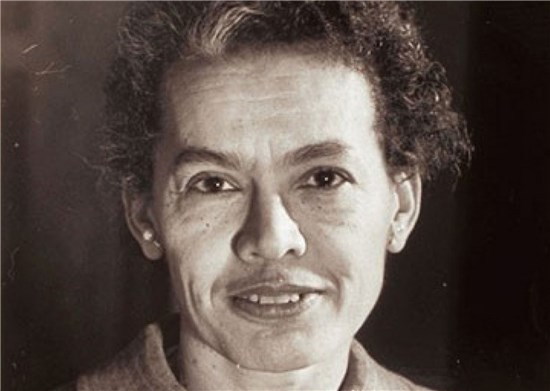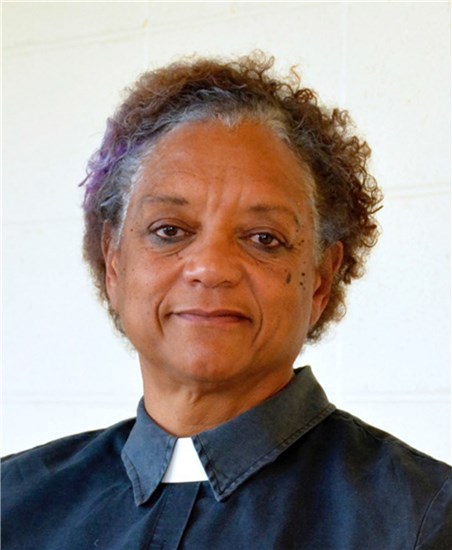

Pauli Murray (1910-1985)
by Becky Stone
The 1960s in America was a decade of revolution. But the revolution began long before for Pauli Murray. Pauli Murray was a writer. Convinced that writing could bring long-awaited change, she lived out her motto: “One person plus one typewriter constitutes a movement.”
Murray was living in New York, working for the WPA(Work Projects Administration), and working on her writing when she heard that her literary hero lived in New York. She wrote a letter asking him to look at her writing. Thus began her life-long mentorship with Stephen Vincent Benet.
The WPA instilled Murray with a desire for change. She applied to University of North Carolina-Chapel Hill to earn a graduate degree in sociology. The university rejected her because she was a Negro. So, Pauli wrote a letter . . . to the president of the university. A correspondence of arguments and counter-arguments began that made headlines.
Her rejection letter came only days after President Roosevelt spoke at Chapel Hill, praising the university as a liberal institution. Murray promptly wrote a letter . . . to Roosevelt. She sent a copy to the First Lady, lest the President overlook her letter. Thus began her lifetime friendship with Eleanor Roosevelt.
In 1941, Pauli Murray and a companion were arrested for causing a disturbance on a Jim Crow bus in Virginia. Unsatisfied with the jail conditions and their treatment by the black male prisoners, Murray wrote two letters . . . one to the sheriff and one to the prisoners. The sheriff fulfilled their requests and the male prisoners changed their behavior.
Pauli lost her case; but after watching her NAACP attorneys, Murray applied to Howard Law School. The only woman in her class, Murray was subjected to discrimination at the all-black, all-male law school. Yet while dealing with her personal battles for respect and equality, Murray led successful sit-ins for integration in Washington, D.C. restaurants.
First in her graduating class, Murray got the Rosenwald Scholarship that most recipients had used at Harvard Law School. Harvard did not accept her, because she was a woman. Pauli wrote a letter . . . to the Harvard Board.
By the 1960s, Murray was a seasoned mover and shaker. She had written “States’ Laws on Race and Color, the “bible’ for civil rights lawyers. Her paper at Howard proposed the seminal idea that led to school desegregation in 1954. Murray was appointed to Kennedy’s Commission on the Status of Women. She helped found the National Organization of Women. Her analytical mind, her familiarity with legal strategies, and her tireless efforts on behalf of the oppressed made her invaluable to the feminist movement. Murray had a new battle cry: “Don’t get mad, get smart!”
In the late 60s, Murray carried her feminist thinking to her spiritual home, the Episcopal Church. Her church did not think women worthy of ordination. She faced one more battle for change and won. In 1977, Murray was ordained as an Episcopal priest. Murray still wrote and preached liberation, but from a place of spiritual peace.
Recommended Reading
Bell-Scott, Patricia. The Firebrand and the First Lady: Portrait of a Friendship: Pauli Murray, Eleanor Roosevelt, and the Struggle for Social Justice. Alfred Knopf, 2016.
Murray, Pauli. Pauli Murray: The Autobiography of a Black Activist, Feminist, Lawyer, Priest, and Poet. The University of Tennessee Press, 1989. (Originally published: Song in a Weary Throat. Harper & Row, 1987.)
Murray, Pauli. Dark Testament and other poems. Silvermine Publishers, Inc., 1970.
Murray, Pauli. Proud Shoes: The Story of An American Family. Harper & Row, 1956.
Rosenberg, Rosalind. Jane Crow: The Life of Pauli Murray. Oxford University Press, 2017.
Becky Stone
Becky Stone was born and raised in Philadelphia. She earned her undergraduate degree at Vassar College in Drama with a minor in French. Her M.A. is in Educational Counseling from Villanova University. She worked for seven years for the Philadelphia School System and taught for 10 years at a classical Christian school in Fletcher, NC.
Becky has been a Chautauqua scholar since 2003 when she first researched and presented Pauli Murray. Her other characters are Harriet Tubman, Rosa Parks, and Maya Angelou. Becky continues to act in theater occasionally. Most often she is on stage as a storyteller at festivals, libraries, and schools.
Bullet Points
-
Black Activist, feminist, attorney, poet, and priest.
-
Life experience that spans the major social and political issues of the 20th century.
-
Southern girl, Northern woman, legal mind, literary expressio ̶ teacher, student of life and always challenging, always progressive.
Quotes
“Hope is a song in a weary throat.”
“It was never hardship which hurt so much as the contrast between what we had and what the white children had.”
“It seemed as if there were only two kinds of people in the world – They and We – White and Colored. … It pervaded the air I breathed. I learned it in hundreds of ways.”
“I wondered why some people were called white and some called colored when there were so many colors and you couldn’t tell where one left off and the other began. Some folks were Aunt Pauline’s color – strawberries and cream – and some were like licorice. Some were cream chocolate and some were dark chocolate. Some were caramel and some were peanut butter. Some were like molasses taffy after it has been pulled awhile and some were like gingerbread. I’d heard somebody say colored people were like a flower garden but I thought they were more like good things to eat.”
“There was pride on both sides of the Fitzgerald family, but my greatest inheritance, perhaps, was dogged persistence, a granite quality of endurance in the face of calamity.”
“One person plus one typewriter constitutes a movement.”
“What is often called exceptional ability is nothing more than persistent endeavor.”
“Black women, historically, have been doubly victimized by the twin immoralities of Jim Crow and Jane Crow. … Black women, faced with these dual barriers, have often found that sex bias is more formidable than racial bias.”
“I’ve lived to see my lost causes found.”
“It had taken me almost a lifetime to discover that true emancipation lies in the acceptance of the whole past, in deriving strength from all my roots, in facing up to the degradation as well as the dignity of my ancestors.”
“It may be that when historians look back on 20th century America, all roads will lead to Pauli Murray . . . civil rights, feminism, religion, literature, law, sexuality – no matter what the subject, there is Pauli.” - Susan Ware, Historian
Timeline
1910 - Born in Baltimore, Maryland to Agnes Fitzgerald and William Murray.
1914 - Moved to Durham to live with grandparents and her aunt after whom she was named, Pauline Fitzgerald Dame. Pauli’s mother had died and her father was unable to take care of the children.
1927 - Pauli Murray graduates high school at the head of her class and goes to New York City to meet entrance requirements at Hunter College.
1933 - She graduates from Hunter College and works for the Work Projects Administration (WPA), Workers Defense League and the NYC Remedial Reading Project.
1938 - Her application to graduate school at the University of North Carolina at Chapel Hill rejected due to her race. Writes a letter to President Roosevelt and sends a copy to the First Lady.
1940 - She is arrested and jailed for protesting Virginia law requiring segregation on buses.
1941 - She entered Howard Law School and encounters overt sex discrimination from faculty and students.
1944 - Pauli Murray graduates from Howard Law School first in her class in June (and the only female). She applies for admission to Harvard Law School’s graduate program but is rejected because of her gender. She enrolls at University of California’s Boalt Hall Law School.
1951 - Murray writes the States’ Laws on Race and Color for the Women’s Division of the Methodist Church, the “bible” for civil rights lawyers.
1960 - Murray travels to Ghana and takes a position as a senior lecturer at the Ghana School of Law in Accra.
1961 - John F. Kennedy appoints Murray to the President’s Commission on the Status of Women Committee (PCSW) on Civil and Political rights. Works with A. Phillip Randolph, Bayard Rustin and Martin L. King, Jr. on civil rights.
1964 - Murray co-authors Jane Crow and the Law: Sex discrimination and Title VII, in which she draws parallels between sex-based discrimination with Jim Crow laws.
1965 - Murray receives a J.S.D from Yale, the first African-American to receive this degree.
1966 - Along with Betty Friedan and thirty others, founds the National Organization for Women (NOW).
1977 - Pauli Murray becomes the first African-American female priest to be ordained by the Episcopal Church.
1985 - Pauli Murray dies of pancreatic cancer in Pittsburgh, PA.
1987 - Her autobiography "Song in a Weary Throat: An American Pilgrimage" is published. The book was reprinted in 1989 by the University of Tennessee Press with a new title: "Pauli Murray: The Autobiography of a Black Activist, Feminist Lawyer, Priest, and Poet."